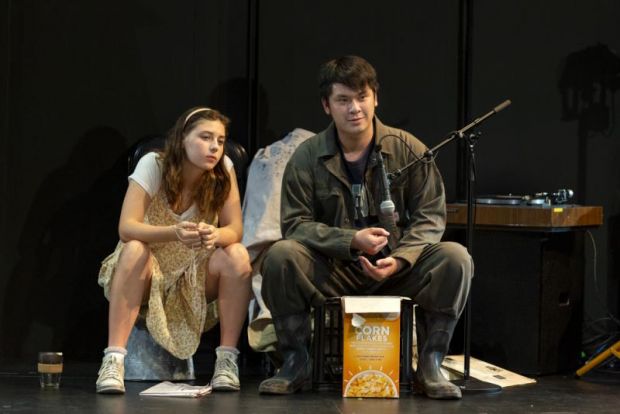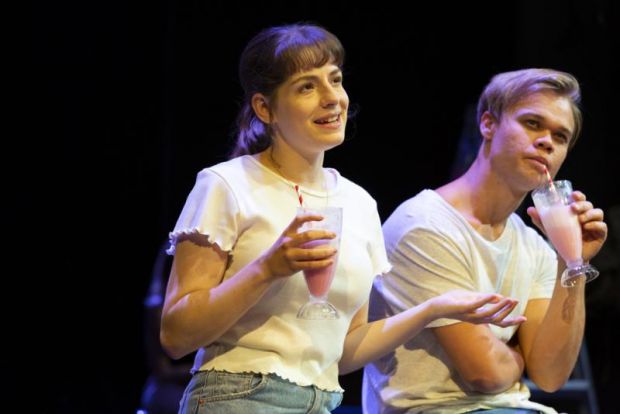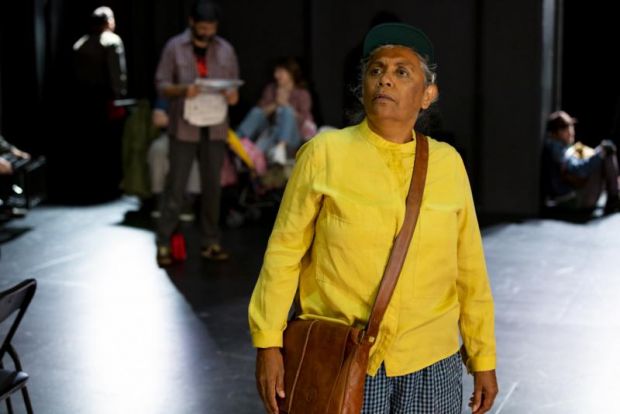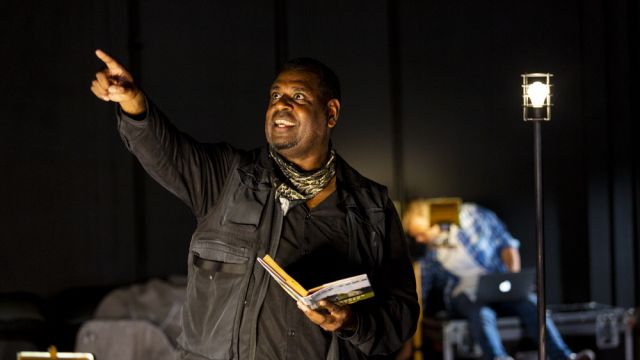Our Town
An empty space suddenly fills with people – all coming in from a cold world outside. It could be a post-apocalyptic setting. Someone finds a book – an artefact fit for a concrete time capsule – evidence of human lives. It is Jimi Bani as the Stage Manager. He tells us the book is a copy of Our Town by Thornton Wilder, and soon he encourages his colleagues to take on the characters and present the play. The only sets are provided by your own imagination, as he describes the town, its streets and its people. The sparse words leave gaps that you quickly fill with faces from your own past – it’s got to be one of the best theatrical special effects that doesn’t dent the production budget.

Our Town was always going to be a controversial choice as QT’s first 2021 production. Some people may be put off by the three-Act running time, and cringe at the fact that Our Town opened on Broadway more than 80 years ago – a time when there was no binge-worthy TV to rush home to. Yes, there is gentle humour, and a historic setting, but this is not a nostalgic exercise or an American history lesson. This play is not about a particular time in history – it is about people at any time, in any town. And, while retaining the play’s text authentically, director Lee Lewis has made the town an ‘everytown’; the voices distinctly Australian. And, with Jimi Bani leading you through this story, time speeds by and you’ll wish that there was more time to meet each character properly. Much more than a mere narrator, Bani is irresistible as the Stage Manager. He shifts the timing, speeds up the action and stops characters from rambling on too long. This provides the actor with a showcase of comic timing, storytelling, and character acting. He adds a guiding warmth and humour that welcomes you into the play – and I don’t think anyone is going to complain about the chance to see an actor of this calibre on stage for the whole three acts.

Our Town’s townspeople are essentially a stream of character parts, but mosaic pieces that need to be sharp. Lee Lewis has cast a troupe of talented craftspeople who maximise every opportunity to capture their character in very few lines. If there are lead roles, it is the young lovers, Emily Webb and George Gibbs. It may be heartless to admit, but I am not usually a fan of teen romance – and yet Lucy Heathcote and Jayden Popik as the young couple are heartbreakingly authentic, teeming with nervous angst and innocent energy as they blossom into young adulthood together. Wilder’s play proves that some things never change. But, while we’ve seen plenty of testosterone-driven teenage boys on the stage and screen, the tables are turned here: Popik’s George is quietly confident that he can change his ways and become a better man; Heathcote’s Emily is the one brimming with jittery hormonal energy, flustered and fighting her emotions to stay in control. These are the freshest teens I’ve seen in a long time.

Hugh Parker homes in on Mr Webb, expertly portraying the essence of a caring father, concerned citizen and pedantic newspaper editor. As mothers in an early 20th-century setting, Amy Lehpamer and Libby Munro form an early feminist duo – singing songs in the choir, planning how to achieve their dreams, regretting parts of their marriage – especially all those hours stringing beans! Both performers present modern women, which doesn’t jar from Wilder’s tone. There are two standout comic cameos: Roxanne McDonald plays several characters but Mrs Soames, the serial wedding attendee in her large hat is surely a lady we’ve all met at parties; and Andrew Buchanan as the tediously technical Professor Willard will take everyone back to their days stuck in a stifling classroom. That old line about ‘no small parts’ is very true in this play. The supporting characters may have minimum stage time, but Silvan Rus, Colin Smith, Egan Sun-Bin and Luca Klarwein all contribute to a community of characters with humour and dignity. Our Town has allowed QT to cast four young performers from its Young Artist programme. Even in the minor role of Rebecca Gibbs, Ava Ryan plays the part of ‘younger sister’ beautifully, imparting important lines that paint a picture of how tiny our place is in the world compared to the size of our planet.

While there are warm scenes and many laughs, Wilder also seeds his play with hints that unsettling times are ahead. The residents of Grover’s Corners have started to lock their doors at night. And is it a coincidence that the town drunk is an artist – the conductor of the local choir? As Simon Stimson, Anthony Standish has very few scenes to achieve his character’s disturbing backstory, and yet he does so brilliantly. The music by composer and sound designer The Sweats captures the edge of sweetness with an underlying threat, complemented by Paul Jackson’s lighting design.

This play may not disrupt genres but, in its day, it did. Today it is deceptively simple. Even Nathalie Ryner’s costumes are subtle – a canvas of op-shop hues… but then a piece of clothing reminds you of something you or a friend wore … don’t be surprised if you find yourself welling up for characters that are mere fleeting glimpses of what might have been – no great dramatic transformations or fulfilled destinies, just plain people like those you see every day. By the final Act, if you thought the play’s message was creeping up, you may feel hit over the head by Wilder’s words. But the humanity gets under your skin, and you realise that the most disruptive thing you can do is the same today as in Wilder’s age: care about people; and be kind to one another – not a bad theme to start the year with.
Beth Keehn
Photographer: Pia Johnson.

Subscribe to our E-Newsletter, buy our latest print edition or find a Performing Arts book at Book Nook.

